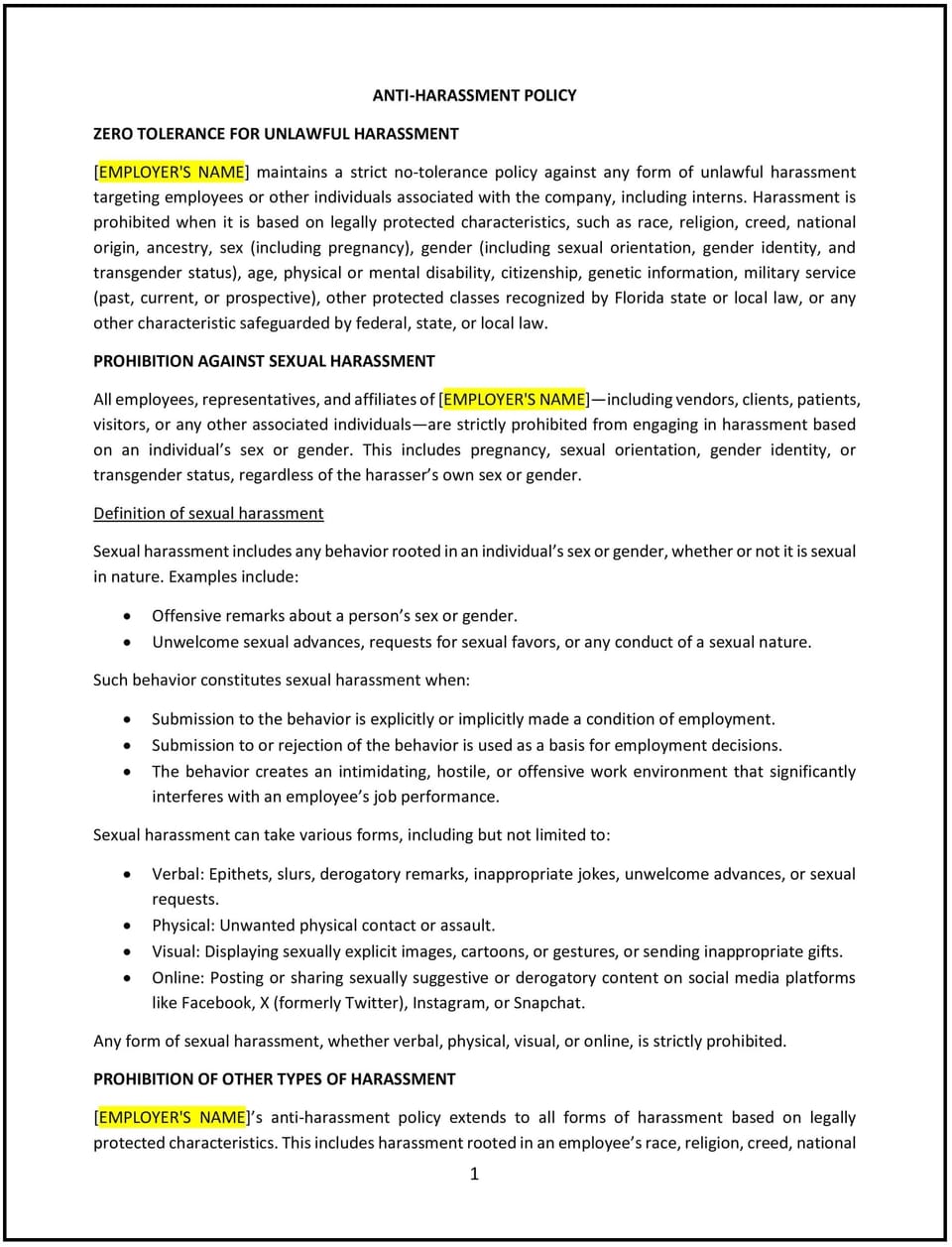Anti-harassment policy (Florida): Free template

Anti-harassment policy (Florida)
An anti-harassment policy helps Florida businesses create a respectful and inclusive workplace environment. This policy outlines procedures for preventing, addressing, and responding to harassment in all forms, including verbal, physical, and digital interactions. It is designed to promote safety, reduce risks, and provide clear guidelines for fostering a culture of respect and accountability.
By implementing this policy, businesses in Florida can demonstrate their commitment to employee well-being, strengthen workplace culture, and align with the state’s focus on protecting individuals from harmful behavior.
How to use this anti-harassment policy (Florida)
- Define harassment: Clearly explain what constitutes harassment, including examples such as discriminatory remarks, unwanted advances, or offensive jokes.
- Prohibit inappropriate behavior: Specify that any form of harassment will not be tolerated in the workplace or during work-related activities.
- Establish reporting procedures: Outline how employees should report incidents or concerns about harassment, including whom to contact and how to document incidents.
- Provide support resources: Offer information about counseling services, employee assistance programs (EAPs), or external hotlines for additional support.
- Train employees and managers: Educate staff on recognizing warning signs, understanding the policy, and addressing harassment appropriately.
- Develop investigation protocols: Create procedures for investigating reports of harassment, ensuring fairness, confidentiality, and timely resolution.
- Communicate the policy: Share the policy with employees during onboarding and through regular communications to ensure awareness and understanding.
- Monitor adherence: Regularly review workplace interactions and address any concerns or discrepancies promptly.
- Update the policy: Periodically assess the policy to reflect changes in workplace dynamics, legal standards, or business needs.
Benefits of using this anti-harassment policy (Florida)
This policy offers several advantages for Florida businesses:
- Promotes safety: Clear guidelines help prevent harassment and ensure a safe environment for employees, customers, and visitors.
- Reduces risks: Proactive measures minimize the likelihood of harassment incidents and their potential impacts on the business.
- Supports employee well-being: Providing resources and support demonstrates the business’s commitment to mental health and respect.
- Enhances workplace culture: A policy that prioritizes respect fosters trust, collaboration, and a positive work environment.
- Builds trust: Transparent procedures for reporting and addressing harassment demonstrate the business’s commitment to fairness and accountability.
- Aligns with community values: The policy reflects Florida’s emphasis on inclusivity, diversity, and mutual respect.
- Improves preparedness: Training and investigation protocols help employees and managers respond effectively to harassment incidents.
Tips for using this anti-harassment policy (Florida)
- Communicate clearly: Ensure employees understand the policy by providing written materials and discussing it during meetings or training sessions.
- Train managers: Educate supervisors on how to handle harassment complaints fairly and consistently while maintaining confidentiality.
- Be proactive: Encourage employees to report concerns early and address potential issues before they escalate.
- Conduct drills: Practice scenarios to ensure employees and managers know how to respond to harassment incidents effectively.
- Stay informed: Keep up with changes in laws, regulations, or societal norms that may affect workplace expectations around harassment.
- Encourage feedback: Solicit input from employees to identify areas for improvement and ensure the policy meets their needs.
- Review periodically: Assess the policy’s effectiveness and make updates as needed to reflect changes in workplace dynamics or legal requirements.
Q: Why should Florida businesses adopt an anti-harassment policy?
A: Businesses should adopt this policy to promote safety, reduce risks, and foster a respectful and inclusive workplace environment.
Q: What types of behavior should be included in the definition of harassment?
A: Businesses should include behaviors such as discriminatory remarks, unwanted physical contact, offensive jokes, or bullying in any form.
Q: How should businesses handle harassment complaints?
A: Businesses should investigate complaints promptly, maintain confidentiality, and take appropriate corrective actions based on findings.
Q: What resources should businesses provide to employees affected by harassment?
A: Businesses should offer access to counseling services, EAPs, or external hotlines to support employees impacted by harassment.
Q: How can businesses prevent harassment in the workplace?
A: Businesses should provide regular training, encourage open communication, and establish clear consequences for inappropriate behavior.
Q: Should businesses require managers to undergo specific training on harassment?
A: Businesses should provide specialized training for managers to ensure they understand how to handle complaints and foster a respectful workplace.
Q: How often should businesses review the policy?
A: Businesses should review the policy annually or whenever there are significant changes in workplace dynamics, legal standards, or business operations.
This article contains general legal information and does not contain legal advice. Cobrief is not a law firm or a substitute for an attorney or law firm. The law is complex and changes often. For legal advice, please ask a lawyer.


